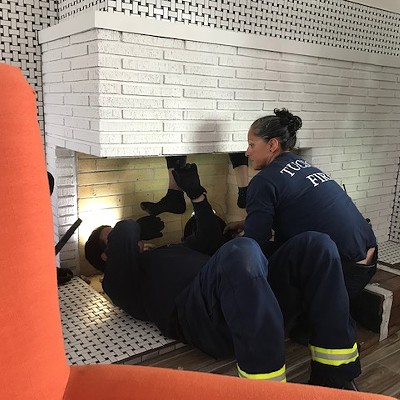In fact, contracting firms are being hit so badly that some have been stockpiling incident reports for months before delivering them to investigators--and at least one area recycler is under investigation by Tucson police for not documenting the possibly stolen property.
According to an April 2006 Zeal Speculation and Investing report, copper prices skyrocketed from 75 cents in early 2003 to $2.75.
"It's a huge thing everywhere," says Det. Joel Bealert, of the Pima County Sheriff's Department. "As they go up, houses are hit."
Perhaps the most outrageous theft happened over Halloween. A thief climbed a utility pole in Rattlesnake Canyon to snatch at least 4,400 feet of half-inch Tucson Electric Power copper cable. Deputies later arrived at the scene to find climbing gear and an indication that someone may have sustained an injury from falling.
Marana Police Department Sgt. Tim Brunenkant says arrests for the thefts normally happen when suspects are caught red-handed. On a recent evening, he says, officers were responding to a nighttime robbery at the AM/PM convenience store at Thornydale and Orange Grove roads when they noticed two men on a neighboring building. He says they were lifting copper fittings from an air conditioner.
"And it's not just the cost (of the stolen copper), but how much it costs to reinstall it," Brunenkant said. "They'll take anything that has copper."
Tucson Police Department Sgt. Randy Carpenter says plunderers are risking life and limb to get the metal. He recalls at least one case in which people opened live electrical boxes to rip out copper wiring.
There have been no documented local deaths resulting from copper thefts, according to Tucson Fire Department Assistant Chief Patrick Quinn (although at least one occurred in Phoenix). His department is feeling the loss, too: Bandits are yanking brass intake fixtures that charge sprinkler systems in large buildings, mainly downtown.
"This isn't just about theft; people's lives are at stake here," Quinn said, adding that the brass fixtures are normally about 50 percent copper.
All TFD stations are checking intake valves of buildings in their service area. From there, fire-prevention specialists will contact businesses suffering from copper robberies.
"They can only do so much, though. Businesses need to stay aware and check for themselves," Quinn said.
In an effort to hamper the efforts of thieves, the city and county recently passed almost-identical ordinances--aligning with a loosely written state law--requiring metal recyclers to identify the metal and the person trying to sell it, and then file a report to police.
The county's version requires buyers to use an online system that makes for quick, easy investigations. The city's allows firms to use the old-fashioned and hard-to-navigate paper system that Carpenter described as "nearly impossible."
He said Honey Bee Recycling, 255 W Fort Lowell Road, voluntarily adopted the online system. However, Metal Management, 1525 W. Miracle Mile, is the largest area recycler. They stuck to paper tickets.
"That basically leaves us to put trust in them to document what they take in," Carpenter said.
Tucson police have conducted at least one undercover operation on Metal Management and turned over evidence to the Tucson City Attorney's Office. "Maybe that will open up their eyes that this is a problem," Carpenter said.
Tucson police recently traveled to Phoenix, where recycling firms have to deal with a more vigorous system of handling and documenting metal, Carpenter said. Buyers must wait seven days before sending the metal to brokers or smelters, unlike Tucson, where "you can just watch them heave it all into one big pile."
"This way, we have a week to investigate where the metal went," Carpenter said.
While the motivation for thieves to nab the metal often comes from drugs, the property normally goes through several hands before making it to recyclers, Bealert says. Thieves, especially on larger heists, will cut up the booty and divvy it out to friends for safekeeping, or barter for drugs or household items.
Bealert described the groups as "unorganized organizations. One guy will know someone who knows how to wash checks, and they'll trade property. Or someone will trade it for some tires."
Alex Jancome, government liaison for the Southern Arizona Home Builders Association, says his organization has been taking a joint-preventative approach toward the problem. He used Oro Valley Police Department as an example.
"They have a letter that will go out to contractors asking them to let police know so they can keep an extra eye out," Jancome said.
SAHBA, Oro Valley Police Department and TEP have also teamed up to conduct sting investigations. The most surefire prevention technique, however, has been to hire security guards.
"It's only getting worse, because it's so hard to stop," Jancome says. "It's like a war."












